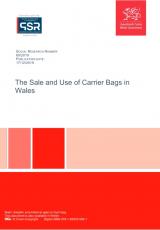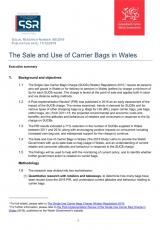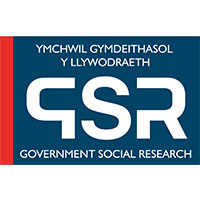The research provides data on bag usage and explores attitudes and behaviours in response to the single use carrier bag charge.
This is the latest release
It provides updated estimates of bag usage in Wales, and an understanding of retailer and consumer attitudes and behaviours in response to the single use carrier bag (SUCB) charge. It built on the findings from a Post-implementation Review (PIR) published in 2016 as an early assessment of the impact of the SUCB charge.
Main findings
Retailers
Between 2015-16 and 2017-18 there was an estimated 21% decrease in the number of SUCBs issued by retailers in Wales. Large supermarkets ceasing to issue plastic SUCBs in the period of interest was the predominant reason for the decline.
Based on the available evidence, 2018-19 was the year plastic Bags for Life (BfL) overtook plastic SUCBs as the most commonly issued bag type in Wales.
In 2017-18, the largest ten supermarkets issued 65.2 million plastic BfL in Wales. Whilst the available evidence should be considered indicative rather than robust, it is clear the number of plastic BfL issued in Wales continued to increase since 2015.
A total of 68% of retailers agreed the SUCB charge should continue. Overall, retailer attitudes since the PIR were still positive regarding the charge. Only 7% disagreed it should continue.
An estimated 51% of small and medium-sized enterprises (SME) retailers agreed the SUCB charge should increase to continue incentivising using BfL; 37% disagreed or strongly disagreed.
An estimated 68% of SMEs thought the BfL proceeds should go to charity, but there was a 50/50 split in response to whether BfL should be brought under the same regulations as plastic SUCBs.
Consumers
Most consumers participating in the research were positive about the SUCB charge. There was a good understanding of the main purpose of the charge, and of the intended environmental benefits. There was clear understanding of the distinction between single-use and reusable bags. However, relatively few consumers understood they were entitled to a free replacement BfL.
Consumers are in a routine of using reusable bags, at least when doing large supermarket shops, and to a lesser extent, when it comes to smaller ‘top up’ shops. Consumers reported that using reusable bags was less likely when doing other types of shopping, such as clothes shopping.
Consumer concerns about the SUCB charge, where present, tended to be about whether the charge was high enough as a disincentive to purchase new bags.
Some consumers were unclear how the funds raised from the SUCB charge was spent, reporting they would like to know more about this.
Many consumers thought the SUCB charge already applied to BfL, and so were supportive of extending it to cover BfL.
Consumers expressed little support for extending the SUCB charge to other single-use plastics such as plastic food packaging. Most believed the onus should be on retailers to take action to reduce single-use packaging at source.
Reports

The sale and use of carrier bags in Wales , file type: PDF, file size: 2 MB

The sale and use of carrier bags in Wales: summary , file type: PDF, file size: 552 KB
Contact
Researcher
Rydym yn croesawu gohebiaeth yn Gymraeg / We welcome correspondence in Welsh.

